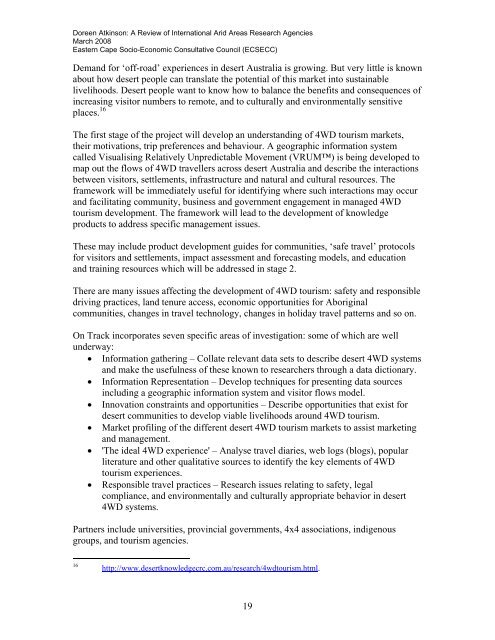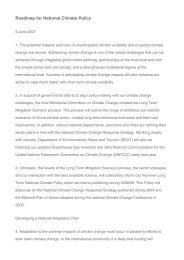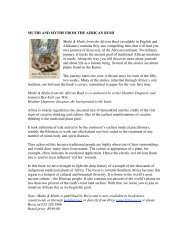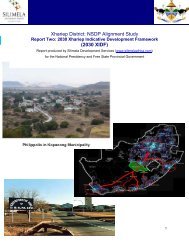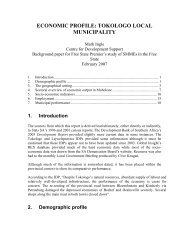report - Arid Areas Programme
report - Arid Areas Programme
report - Arid Areas Programme
You also want an ePaper? Increase the reach of your titles
YUMPU automatically turns print PDFs into web optimized ePapers that Google loves.
Doreen Atkinson: A Review of International <strong>Arid</strong> <strong>Areas</strong> Research Agencies<br />
March 2008<br />
Eastern Cape Socio-Economic Consultative Council (ECSECC)<br />
Demand for ‘off-road’ experiences in desert Australia is growing. But very little is known<br />
about how desert people can translate the potential of this market into sustainable<br />
livelihoods. Desert people want to know how to balance the benefits and consequences of<br />
increasing visitor numbers to remote, and to culturally and environmentally sensitive<br />
places. 16<br />
The first stage of the project will develop an understanding of 4WD tourism markets,<br />
their motivations, trip preferences and behaviour. A geographic information system<br />
called Visualising Relatively Unpredictable Movement (VRUM) is being developed to<br />
map out the flows of 4WD travellers across desert Australia and describe the interactions<br />
between visitors, settlements, infrastructure and natural and cultural resources. The<br />
framework will be immediately useful for identifying where such interactions may occur<br />
and facilitating community, business and government engagement in managed 4WD<br />
tourism development. The framework will lead to the development of knowledge<br />
products to address specific management issues.<br />
These may include product development guides for communities, ‘safe travel’ protocols<br />
for visitors and settlements, impact assessment and forecasting models, and education<br />
and training resources which will be addressed in stage 2.<br />
There are many issues affecting the development of 4WD tourism: safety and responsible<br />
driving practices, land tenure access, economic opportunities for Aboriginal<br />
communities, changes in travel technology, changes in holiday travel patterns and so on.<br />
On Track incorporates seven specific areas of investigation: some of which are well<br />
underway:<br />
• Information gathering – Collate relevant data sets to describe desert 4WD systems<br />
and make the usefulness of these known to researchers through a data dictionary.<br />
• Information Representation – Develop techniques for presenting data sources<br />
including a geographic information system and visitor flows model.<br />
• Innovation constraints and opportunities – Describe opportunities that exist for<br />
desert communities to develop viable livelihoods around 4WD tourism.<br />
• Market profiling of the different desert 4WD tourism markets to assist marketing<br />
and management.<br />
• 'The ideal 4WD experience' – Analyse travel diaries, web logs (blogs), popular<br />
literature and other qualitative sources to identify the key elements of 4WD<br />
tourism experiences.<br />
• Responsible travel practices – Research issues relating to safety, legal<br />
compliance, and environmentally and culturally appropriate behavior in desert<br />
4WD systems.<br />
Partners include universities, provincial governments, 4x4 associations, indigenous<br />
groups, and tourism agencies.<br />
16<br />
http://www.desertknowledgecrc.com.au/research/4wdtourism.html.<br />
19


